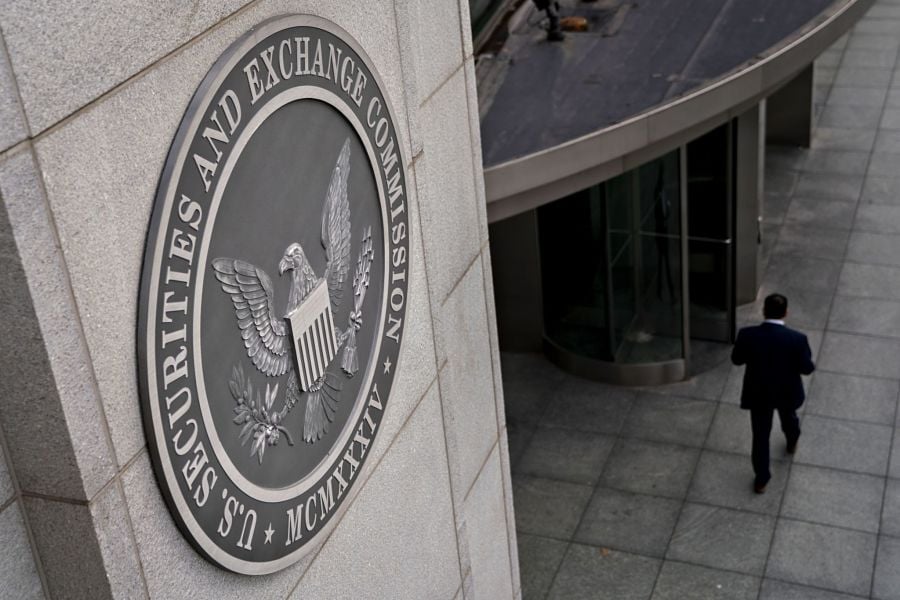

A Securities and Exchange Commission proposal that would allow a large swath of money managers to avoid disclosing their stock holdings has drawn strong criticism from a key Democratic lawmaker and financial industry and investment adviser trade groups.
The SEC would raise the reporting threshold from $100 million to $3.5 billion for the so-called Form 13F, according to the proposal released in July. The agency said the higher number would better reflect the size of today’s equity markets compared to 1975, when the current threshold was put in place.
The agency said the new parameters would require disclosure for about 90% of current 13F filings while relieving the filing burdens of about 4,500 smaller money managers.
But critics of the proposal said raising the reporting requirement so dramatically would deprive investors and financial advisers of a significant amount of the information they use to make investment decisions, manage investment strategies and monitor activist shareholders. The changes also were characterized as a gift to the hedge fund sector.
Rep. Maxine Waters, D-California and chairwoman of the House Financial Services Committee, called on the SEC to withdraw the proposal, which she said would reduce transparency on more than $2.3 trillion in assets. She has urged the agency to do only rulemaking that is related to the coronavirus pandemic.
“Instead, inconsistent with its mandate to protect investors, maintain fair and orderly markets, and facilitate capital formation, the Commission continues to propose and adopt deregulatory rules that suppress shareholder rights, impair shareholder engagement, reduce capital market transparency and decrease investor protection, overall,” Waters wrote in an Oct. 2 letter to SEC Chairman Jay Clayton.
The public comment period ended last Tuesday. Many of the letters the agency received opposed the proposal.
The Investment Adviser Association said the SEC had raised the reporting threshold too high and suggested a $500 million floor to ease compliance burdens for smaller money managers. The group said most SEC-registered investment advisers file a Form 13F.
“We recommend that the Commission raise the reporting threshold sufficiently to provide relief to the smallest managers but not so high that managers, investors, and the markets lose the myriad benefits of the data,” IAA general counsel Gail Bernstein wrote in a Sept. 29 comment letter.
The draft rule would allow 89% of current 13F filers to cease reporting and deprive investors of accurate information about stock ownership, according to Morningstar.
“The filings surface investment ideas for individual investors who perform their own investment selection, but they can also help individual investors research asset managers they might like to hire,” Morningstar officials wrote in a Sept. 29 comment letter.
The American Securities Association charged that $3.5 billion threshold was “outrageously inflated” and would allow activist hedge funds to hide their stake in public companies.
“Rather than improve transparency in the U.S. securities markets, increase the integrity of our markets, and protect worker rights, this proposal asks the public to side with billionaire hedge fund managers who destroy companies and fire workers because the current regulatory regime costs them too much,” ASA Chief Executive Christopher Iacovella wrote in a Sept. 29 comment letter.
The Chamber of Commerce also opposes the proposal.
“We are concerned that a change in the reporting threshold would significantly reduce transparency and inhibit communication between companies and their investors,” Chamber executive vice president Tom Quaadman wrote in a Sept. 29 comment letter.
One voice in support of the proposal was MarketCounsel, a legal and compliance consultant for investment advisers.
“Raising the threshold provides relief for many smaller investment advisers who are already have significant regulatory compliance and reporting obligations,” MarketCounsel Chief Executive Brian Hamburger and the firm's chief regulatory counsel, Daniel Bernstein, wrote in a Sept. 29 comment letter. “The change would reduce the compliance burden for almost 90% of the investment managers who currently report on Form 13F, while retaining over 90% of the information currently gathered in the filings.”

While industry statistics pointing to a succession crisis can cause alarm, advisor-owners should be free to consider a middle path between staying solo and catching the surging wave of M&A.

New joint research by T. Rowe Price, MIT, and Stanford University finds more diverse asset allocations among older participants.

With its asset pipeline bursting past $13 billion, Farther is looking to build more momentum with three new managing directors.

A Department of Labor proposal to scrap a regulatory provision under ERISA could create uncertainty for fiduciaries, the trade association argues.

"We continue to feel confident about our ability to capture 90%," LPL CEO Rich Steinmeier told analysts during the firm's 2nd quarter earnings call.
Orion's Tom Wilson on delivering coordinated, high-touch service in a world where returns alone no longer set you apart.
Barely a decade old, registered index-linked annuities have quickly surged in popularity, thanks to their unique blend of protection and growth potential—an appealing option for investors looking to chart a steadier course through today's choppy market waters, says Myles Lambert, Brighthouse Financial.
